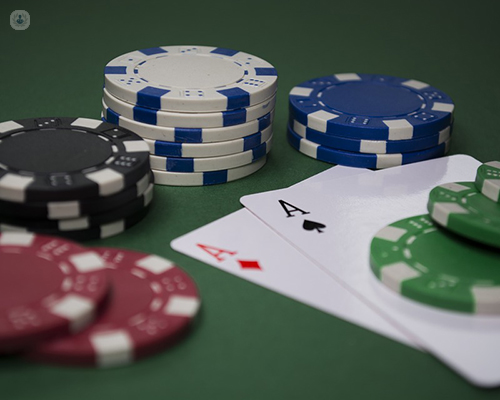

What is a gambling addiction?
Problem gambling, compulsive gambling, or gambling addiction is an urge to gamble with no need felt to stop, or disregarding any type of negative consequence as a result of the habit. Problem gambling can be destructive and can lead to job loss, debt, fraud, crime or problems in family relationships.

What are the symptoms of compulsive gambling?
The most common symptoms of compulsive gambling are:
- Being irritable or worried when trying to stop playing or playing less
- Borrowing or stealing money in order to play more or to play at all
- Betting larger amounts of money to recover what was previously lost
- Lying about the amount of money spent on games
- Losing a relationship, work or other opportunities as a result of gambling
- Betting larger amounts to feel more excitement
The following questions can help to self-assess problem gambling:
- Do you spend a lot of time thinking about gambling and betting?
- Have you ever tried to cut back on your gambling (or stop) but have not been successful?
- Do you carry on playing after losing money in an attempt to win it back?
- Do you borrow money from others to continue playing?
- Has your gambling ever affected personal relationships or work?
- If you’re not gambling, do you feel restless or irritable?
- Do you gamble as an ‘escape’ from problems or difficulties?
- Do you spend more and more on gambling as time goes by?
- Have you ever lied to anyone about how much you spend on gambling?
- Have you ever stolen money to fund your gambling?
If your answers to ‘yes’ are:
- Once: you may need some help for this particular issue, as one issue can be a problem which later leads to other habits developing.
- Three times: indicates ‘problem gambling’ - your gambling may be out of control and seeking help would be advisable
- Five times or more: indicates ‘pathological gambling’ as gambling is likely affecting all parts of life, and you should seek professional help.
What are the causes of compulsive gambling?
Compulsive gambling may be caused by several factors, not one in particular. Certain contributing factors include:
- A family history of gambling problems
- Working in a casino or betting shops
- Mood disorders such as anxiety or depression
- Personality disorders such as borderline personality disorder (BPD)
- Substance abuse
- Personality traits such as competitiveness, tendency to boredom or search for sensations
- Stressful situations
- Growing advertising of online games and betting
Problem gambling is more likely to develop in certain kinds of gambling, such as Internet betting or Internet games. Problem gambling is also more likely to develop in men than women, though it affects both genders.
Can compulsive gambling be prevented?
It is important to intervene at the first signs (such as those listed above) to prevent the addiction getting worse.
What is the treatment for compulsive gambling?
The first step in the treatment of an addiction is always to recognise it. Once recognised, it can be treated with different therapies:
- Cognitive behavioral therapy (CBT)
- Self-help and support groups
- Some medications such as antidepressants or opioid antagonists, although it is still unclear how each patient will react to these
